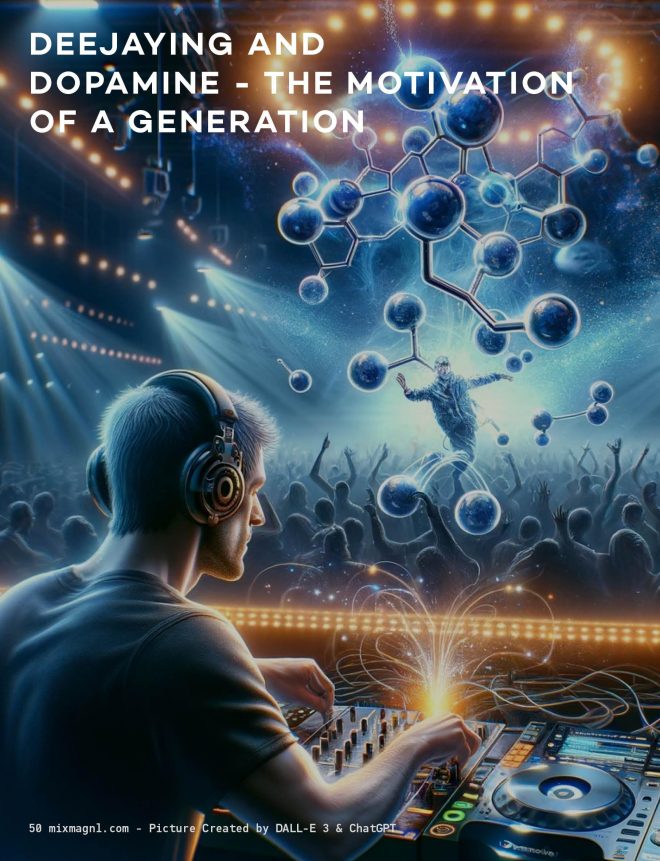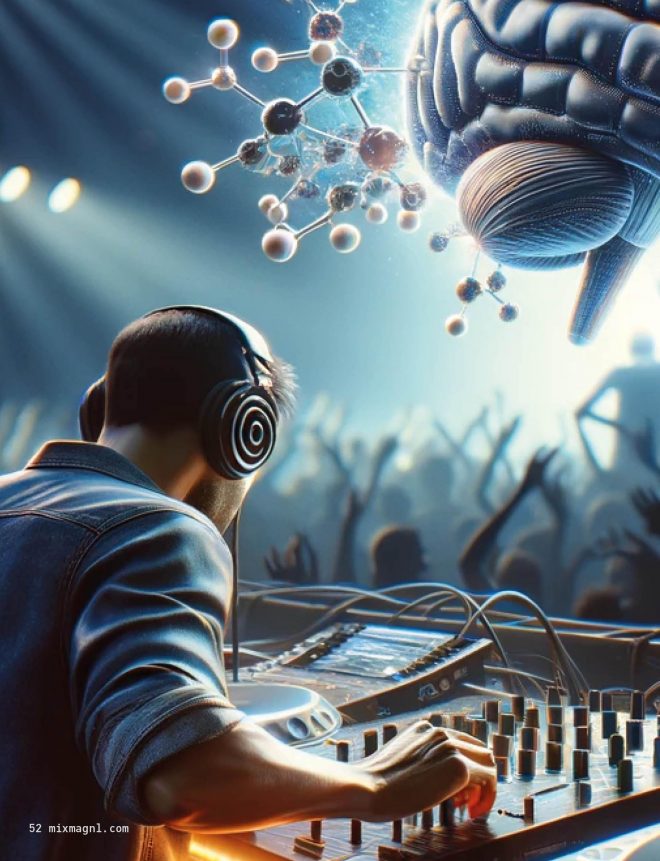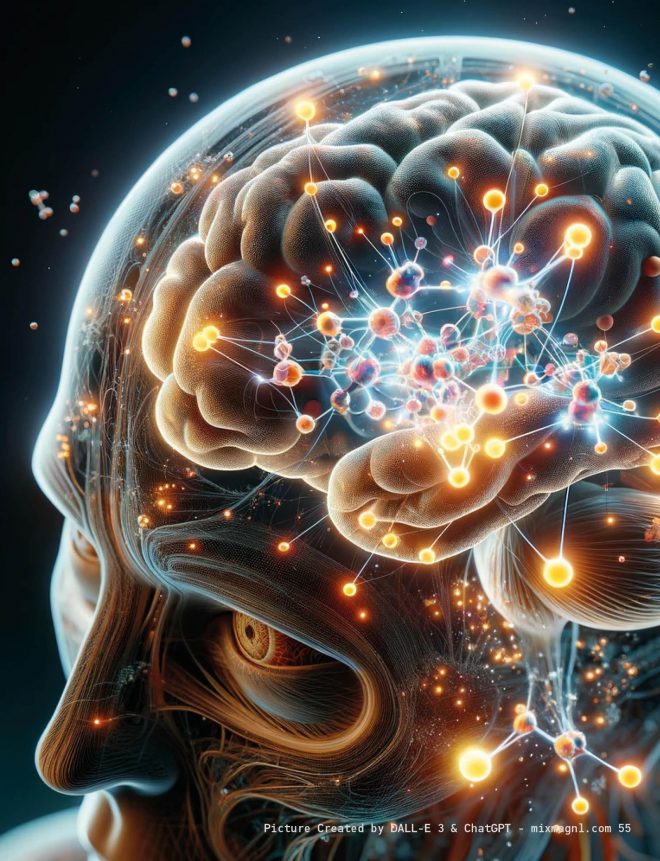Deejaying and dopamine: the motivation of a generation

The following article is a reflection on the human condition. Its objective is to expose certain behavioral patterns that are common to most people, and how Deejaying may be a surprisingly adequate response to them. It focuses on the relationship between a generation-wide struggle to find motivation and music, specifically deejaying, and its increasing popularity. It contains scientific facts, some history and a bit of conjecture. It’s meant to offer an opportunity to reflect on how we make decisions on our quest for happiness and to answer a simple question: why are there so many DJs around nowadays?
Whether you work in the industry or not, take a moment to think about how many people you have met over the past few years that told you they DJ, in some form or another. It definitely feels like most dance floors at underground parties have more DJs in them than regular party-goers.
Why is that? And what’s behind it? We could argue that there are three main aspects to deejaying that are particularly appealing to the human brain: finding new music (a.k.a. digging), performing for an audience and the sense of belonging to an affiliation group, often known as a “scene”. They may all relate to old evolutionary traits and a neurotransmitter that’s been receiving a lot of attention lately: dopamine.
Before going deeper into the neuro-chemical correlations, let’s take a step back and look at how access to music has evolved over the past few decades (if you’re familiar with this piece of recent history feel free to skip to the next paragraph). The evolution of formats from vinyl records and cassette tapes to CDs and eventually to MP3s have made it cheaper and more accessible for anyone to find new music. The real boom was during the Napster/LimeWire/eMule era. Those platforms made finding music as easy as looking something up on a web browser and, even more importantly, completely free to the consumer. Of course artists and labels lost millions in the process but consumers were given unprecedented access to a wealth of music, almost all of it actually. Music discovery had reached a new level. Burning CDs or ripping mixtapes grew connections to the songs people identified with and made some of them more confident about their taste.
This was before streaming platforms changed the general public’s approach to music consumption, making it somewhat more passive for the average consumer. Furthermore, DJ equipment became massively more accessible than the clunky turntables DJs had to start with in the 70s and 80s. Sure, some will say “real DJs play Vinyl” but the reality is that many artists today have started on a laptop + controller set up before eventually moving onto other gear… or not. Others have started on vinyl and made the switch to digital for a variety of reasons, among which the obvious practical aspect of not having to sling a heavy bag of tunes around. It’s also true that in the past decade vinyl sales have reached all time highs, possibly as a precise reaction to the increased accessibility and as a sort of “underground gatekeeping” paradigm that follows the “vinyl only” mantra. The truth is that nowadays there are close to infinite options to play music from the widest range of devices that has ever been available to both amateurs and professionals, who can now pick whatever suits their style best.
Now that we’ve covered the accessibility topic, let’s look into the neurochemical side. First things first, what does dopamine actually do? Without getting into too much detail about the mechanics of how it acts on the brain (for that I recommend this episode of the Huberman Lab Podcast), dopamine is the hormone responsible for our feeling of motivation and drive, and is an integral part of our brains’ reward system. It is not related to pleasure as many may think. Evolutionarily, the widest accepted theory goes that it motivated living beings to seek and forage for basic existential needs outside their bodies (food, shelter, sex etc.). It’s important to note that getting the reward itself does not release dopamine, as various studies have proven, but that it’s exclusively produced when moving towards something that we perceive as “good”.
As many of us know and experience daily, our reward systems have been somewhat abused by our contemporary lifestyles and technologies. Excessive food, smartphone use and other sources of overstimulation cause us to produce levels of dopamine so high our brains haven’t evolved to handle them yet. As a way to counter this phenomenon, our receptors go through a process called down-regulation, which means they become less sensitive to the same levels of dopamine, needing us to produce higher quantities in order to feel the same level of motivation and drive. This is a key concept that will be referenced again further ahead.
Some may go as far as saying that Zuck and the likes have “hijacked” these systems to keep us glued to our phones and increase their advertising revenue. Another popular narrative these days is that we constantly crave instant gratification because in our society we’re accustomed to having everything we want practically instantly. I’m not here to argue in favor of or against this, although, anecdotally, I have experienced surges in general levels of motivation after taking tech-detoxes, or even after just a couple of days of significantly reduced screen-time.
How does this relate to music? Well, if dopamine is released when we’re searching, seeking, foraging or otherwise expecting some kind of reward, how much of it do you think is produced when looking for new music? And what about that feeling of anticipation when you get that first gig in an actual club or festival? What about the first time you release a track or podcast? And when you get hundreds of people screaming your name? Even just the thought of all this might get you motivated, which means your brain is releasing dopamine just by imagining these experiences.
However, there’s a bit of a catch. It turns out that our brains release the most dopamine when the outcome of the foraging attempt is unsure. Many experiments, including the famous rat experiment on addiction, have proven that if we repeat an action and get a positive outcome every time, we’ll eventually get bored and our brains will no longer produce as much dopamine for the same activity. However, if the outcome is only positive sometimes (50% approximately for maximum dopamine release), meaning expectations are not always met, we’ll be motivated to repeat that action basically ad infinitum. This is the basic neural mechanism behind addiction.

On that note, digging is arguably the first step into the world of deejaying. Based on what was discussed so far about dopamine and motivation, consider a simple question: how often do you find music you actually like? Would you say that you like every song you hear? Probably not. Over time, in fact, most people probably get pickier with the music they listen to, further reducing the chances of actually getting the desired reward. Granted, over time your sources should get better, but that is eventually evened out by becoming even pickier and feeling the need to dig deeper to find more and “better” music, according to evolving individual tastes. That said, there is a particular quality of music that drives our brains to respond emotionally: groove. Groove, in music, is defined by the Cambridge Dictionary as “a musical rhythm that is enjoyable and makes the listener want to move or dance” and it occurs when the beat division in a piece of music creates momentum. Momentum is when we believe that we can expect certain things to happen in the music at certain points in time. Whether those expectations are met, or intentionally broken, is what makes a piece of music more or less interesting to us. Striking the right balance, as discussed above, will make a piece release the optimal amount of dopamine. Digging, in and of itself, is a relatively easy, satisfying process, provided you have the funds to invest (because pirating is not cool!). It’s much easier than actually learning how to compose a piece of music anyway. No wonder there’s way more DJs than producers. Another thing is to know how to arrange the tracks you’ve found into coherent and engaging sets. That’s where the skill lies. So, an intrinsic part of the process is that over time you will need to find more and “better” music in order to satisfy your down-regulated dopamine system.And once you start playing gigs, it goes deeper.
Picture this, you’re in your teens, you just got a bunch of new tracks on your laptop and a brand new controller plugged in. You invite some friends over, fire up your speakers and… it’s on! In this scenario you don’t even have to be mixing the tracks, just playing one after the other and having a single friend ask “What’s this banger?” is enough to make you feel omnipotent. A feeling that some may find incredibly enticing, if not downright addictive. Discovering new music for your own listening pleasure is one thing, but sharing it with others, and the relative feel-good hormones that come with it, are experiences that may cause such deep satisfaction to determine one’s life path. Or at least how some choose to spend a lot of their time from then on. Fast-forward to a few years later, when some may have experienced their first gigs in clubs or parties with an actual crowd and a proper sound system. As gig experiences accumulate, not all will feel the same. Every DJ has a bit of a different idea of what a perfect gig is and it’s safe to say that in the first years of one’s career behind the decks, if things go well, there will be several shows that top everything experienced before. And that’s great! A clear sign of progress. The tricky part is when, for reasons out of one’s control, some experiences don’t quite hit the sweet spot as others did. All too often, it may happen that something may not be quite right. Maybe the speakers don’t sound as clean or one of the turntables is busted. Maybe the crowd is a bit smaller than it was last time around. Whatever it may be, standards get higher which, in this context, is another way of saying “you need more dopamine to feel as motivated as you did before”. It makes sense. When you start accumulating good experiences behind the decks, it’s hard to settle for more mediocre ones.

Although the ones that you now consider mediocre, might have been an unreachabledream at some point in the past. As we grow, we change and our experiences dictate our expectations. Once someone feels the state of flow that a “perfect gig” gives, they will probably seek it again. And that may get harder and harder to find. However, most will still be willing to power through it, especially if they believe it may improve chances of fitting into the affiliation group in question, a.k.a. “the scene”.
We said earlier that dopamine is the key neurotransmitter that motivates us to forage. Humans used to forage for nuts, berries and wild boars back in our hunter-gatherer days. Now, some of us forage for music, among other things. However, there are also other keys to survival we’ve always been foraging for and still very much do: belonging and status. Belonging to a social group increased our chances of survival and obtaining status within said group further ensured them. By this extremely primitive yet relevant logic, who do you think has a better chance of survival than the person at the center of a huge group in charge of beating the drums? The one responsible for causing such vast amounts of enjoyment and to which all the attention is directed even when off-stage? Standing out from a crowd in an admirable way by assuming positive leadership roles, even if highly contextual, is as valued as always in society and is sure to pay dividends both in mainstream and underground culture. Also, musicians have always been considered sexy too, right? Even Darwin argued that music could have been an early form of courtship. Musicianship, like the extravagant colors of the birds of paradise, is a sign of sexual fitness. The logic, simply put, goes as follows: in order to sing, dance or perform music well, one must be physically and mentally fit. We may also have evolved to believe that if an individual has enough leisure time to practice musical skills, they are probably able to secure more than enough food and resources for their survival.
Enter: social media. Few things scream status nowadays like a K or an M after the number of followers or streams on someone’s profile. In fact, a few too many moments get manufactured for the sake of reaching that goal. It becomes especially challenging when one’s ability to work depends directly on their hype. Plus, it feels good to be in it, but it could be taken away at any moment. That’s why often artists who produce a hit song feel creatively stuck afterwards. The pressure to produce more hits might be too strong. Or if a video reaches 1M views, every next one that doesn’t achieve the same visibility might feel like a failure. We often fail to realize how closely dopamine is tied to this. But it’s quite clear once we look into it a little deeper. Once the biggest reward is achieved (i.e. the best gig, the best track, the most plays / likes, etc.), how can anything compare?
So, what do we do with all this information? We can start by practicing to let go of this logic and carry on for the love of the process. Deejaying is an inherently social art-form and becoming a platform for people to discover new music is a privilege and a responsibility that can bring immense joy to so many. A great DJ is precisely that: a medium through which people can discover the new favorite music they had never heard before. It would also be wise to check in with yourself as often as possible and understand what motivates you. There are no wrong answers as long as you look deeply and consistently enough. Based on those answers, which evolve over time, you can decide where to focus your time and energy at various stages of your journey. Another piece of advice would be not to rush and to detach from the idea of instant gratification. Patience is a virtue that can be cultivated and has done a great deal of service to those who developed it. This can probably come in handy when applied to other aspects of life beyond deejaying.
In short, keep doing what you love, keep your dopamine levels in check and remember to do it all for the right reasons, which to me are: love of the craft, love of sharing and love for others. And since you made it this far, I’d like to leave a bit of Zen wisdom with you. It’s ok to want to be seen, it’s ok to consider status as important but we must learn to accept the impermanence of existence and to realize that once we’re gone, people may or may not remember us or our music, and that’s 100% ok.
PS: I deliberately decided to leave the topic of drugs out of this as it’s a knotty subject. However when it comes to dopamine, we must briefly consider them, since drugs (especially cocaine and amphetamines) have deeply detrimental effects on the brain’s reward system. How this affects our motivation is extremely subjective and everyone is responsible for their own decisions. For more information about how drugs affect our dopamine circuits please consult the following articles:
https://nida.nih.gov/publications/drugs-brains-beh...
https://pubmed.ncbi.nlm.nih.gov/31905114
SOURCES INCLUDE:
Hoebel, Bartley G., et al. “Natural Addiction.” Journal of Addiction Medicine, vol. 3, no. 1, Mar. 2009, pp. 33–41, https://journals.lww.com/journaladdictionmedicine/...
Huberman, Andrew. “Controlling Your Dopamine for Motivation, Focus & Satisfaction | Huberman Lab Podcast #39.” YouTube, 27 Sept. 2021,
www.youtube.com/watch?v=QmOF0crdyRU
Levitin, Daniel J. This Is Your Brain on Music : The Science of a Human Obsession. New York, N.Y., Dutton, 2006.
Reynolds, Simon. Retromania : Pop Culture’s Addiction to Its Own Past. New York, Farrar, Straus And Giroux, 2011.
Rose, Frank. The Art of Immersion: How the Digital Generation Is Remaking Hollywood, Madison Avenue, and the Way We Tell Stories. W. W. Norton & Company, 28 Feb. 2011.
Ross, Alex. The Rest Is Noise. Farrar, Straus and Giroux, 16 Oct. 2007.


